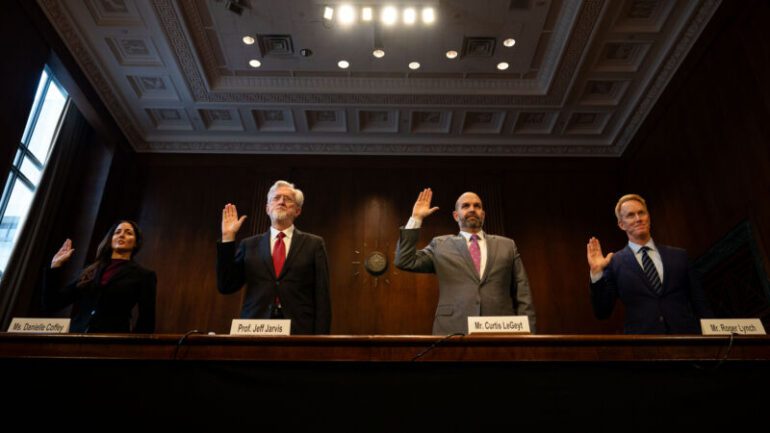TL;DR:
- News industry leaders advocate against classifying journalism as fair use for AI training data.
- They propose a licensing system akin to music rights clearinghouses for AI training content.
- The plea for action occurs during a US Senate Judiciary Committee hearing on the future of journalism and AI.
- Senators Blumenthal and Hawley play pivotal roles in addressing AI legislation and its impact.
- The news executives emphasize the existential crisis faced by the news industry.
- OpenAI claims fair use for AI training data but is engaged in licensing negotiations with news providers.
- Curtis LeGeyt highlights the adverse effects of AI on TV broadcast journalism.
- Jeff Jarvis dissents, advocating against limiting fair use in journalism.
- Concerns are raised about AI’s potential to spread misinformation and disinformation.
- Discussion touches on tech monopolies, AI governance, and Section 230 of the Communications Decency Act.
Main AI News:
In the hallowed chambers of a US Senate Judiciary Committee hearing, the battle lines were drawn as news industry titans faced off against the giants of Big Tech in a high-stakes showdown over the future of AI and journalism. At the heart of the matter was the contentious concept of “fair use” and its application to AI training data.
Executives from the news industry, in a united front, made a fervent plea for legislative clarity regarding the utilization of journalism as a tool to train AI assistants like ChatGPT. They adamantly asserted that this should not be considered fair use, a position that stands in direct opposition to tech behemoths such as OpenAI.
The news moguls advocated for a licensing framework that would compel tech giants to pay for the content, akin to the mechanisms that govern music rights clearinghouses. Their call for action unfolded during a hearing titled “Oversight of AI: The Future of Journalism,” orchestrated by the formidable duo of Senator Richard Blumenthal of Connecticut and Senator Josh Hawley of Missouri, both instrumental in advancing bipartisan AI legislation and conducting a series of impactful hearings on AI’s impact.
Blumenthal, with a sense of urgency, characterized the situation as an “existential crisis” for the news industry. He urged Congress to avoid the mistakes made in addressing the rise of social media and instead act swiftly to safeguard journalism’s future in the age of AI.
OpenAI, for its part, conceded the need for substantial amounts of copyrighted material to train large language models like ChatGPT but argued that such usage falls under the umbrella of transformative fair use, a defense rooted in US copyright law precedent. Nevertheless, they are currently engaged in negotiations with news providers for licensing content.
However, the news executives argued vehemently that these efforts were insufficient, citing the ominous trend of shuttered newsrooms across the United States and dwindling media revenues while Big Tech’s profits continue to soar. Condé Nast CEO Roger Lynch underscored the irreplaceable role of journalism in society, stating that generative AI had been built upon “stolen goods,” referring to the unauthorized use of AI training content from news outlets.
In addition to Lynch, the hearing featured prominent witnesses, including Jeff Jarvis, a veteran journalism professor, Danielle Coffey, the president and CEO of News Media Alliance, and Curtis LeGeyt, president and CEO of the National Association of Broadcasters. Coffey echoed the concerns of her counterparts, highlighting how generative AI competes directly with original news articles and serves the same purpose and audience.
When Senator Hawley sought solutions to the problem, Lynch proposed a straightforward legislative clarification. He suggested that if Congress could affirm that using publisher content for AI model training and output is not fair use, the free market would naturally address the rest. Lynch drew parallels with the music industry’s collective rights organizations and their role in simplifying content usage.
Curtis LeGeyt, representing TV broadcast journalists, voiced similar concerns about the unauthorized use of broadcasters’ news content in AI models, which erodes audience trust and discourages reinvestment in local news.
The debate over fair use took center stage during the hearing, with lawmakers largely aligning with the news executives’ perspectives. However, Jeff Jarvis offered a dissenting view, advocating against limiting fair use, emphasizing its crucial role in journalism and expressing concerns about potential privacy and freedom implications.
Despite Jarvis’s dissent, the prevailing sentiment among those present favored the news industry’s stance on content licensing. Senator Hawley, in particular, voiced concerns that an expansive interpretation of fair use by tech companies could render copyright law ineffective.
Beyond the fair use debate, the hearing spotlighted the perils of AI in propagating misinformation and disinformation, especially through deepfake technology. Senator Hawley emphasized the threat posed by fake images of trusted news anchors and underscored the need for vigilance in safeguarding trust in journalism.
The discussion also touched on the issues of tech monopolies, broader AI governance implications, and the role of Section 230 of the Communications Decency Act. Senators Blumenthal and Hawley argued that Section 230 should not shield AI models from liability, a stance met with resistance from Jarvis, who asserted that AI should be viewed as a tool whose misuse is the responsibility of users.
As the curtains closed on the hearing, it was evident that Senators Blumenthal and Hawley were the driving forces behind the proceedings. The question of whether their efforts would gain momentum in Congress and lead to legislation addressing these critical issues remained uncertain.
Conclusion:
The clash between the news industry and Big Tech over the status of journalism as AI training data presents a critical challenge. The call for a licensing framework reflects the industry’s urgency in protecting its content. While the debate over fair use continues, the potential impact on AI and journalism markets underscores the need for legal clarity and collaborative solutions to navigate this complex landscape.

